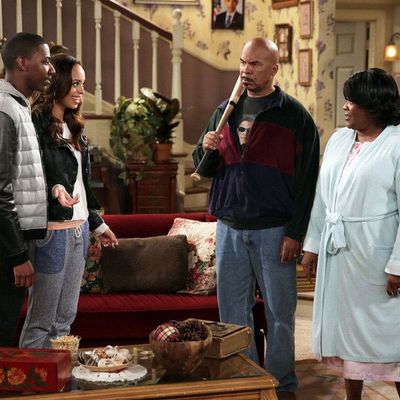
At 26, Jerrod Carmichael, the co-creator and star of The Carmichael Show, is too young to have watched most of Norman Lear’s sitcoms in their original runs, even though he has name-checked Lear as an influence. He must have caught them in syndication or on DVD, because his self-named sitcom, which airs its pilot and second episode tonight, suggests that he’s studied them the way a painter studies a still life. Maybe that’s why NBC is burning off the first (and so far, only) six episodes in just three weeks: the network-TV landscape no longer has a place for shows like Lear’s All in the Family, Maude, The Jeffersons, and Good Times, which drew huge audiences in the 1970s by mixing topical humor and broad sitcom farce and letting the uncomfortable coexist with the rudely entertaining. The “broad” and “rude” parts will always be welcome, but the rest is verboten now. Even the political humor on cable sitcoms trends more towards something like Veep, where actual persons and parties and events might be name-checked, but always in an absurdist way, never one that might actually get people thinking, or make them mad.
You get a little taste Lear in in the pilot. It introduces us to Carmichael (playing a character named Jerrod, of course; where does this sitcom formula come from, and why is it considered necessary?) and his girlfriend Maxine (Amber Stevens). They’ve been living together for three weeks but haven’t yet told Jerrod’s parents, who are an extreme example of opposites attracting. Jerrod’s father, Joe (David Alan Grier), is an arch-conservative rationalist, while his mother, Cynthia (Loretta Devine), is deeply religious; neither would take kindly to their son shacking up with his girlfriend. (There’s something almost charmingly old-fashioned about the idea of this being an issue for anybody.) When Joe and Cynthia get into an argument about religion versus civil liberties, you’re seeing an American cultural fault line exposed so that the sitcom’s writers can hurl jokes into it. Devine and Grier, who are just terrific, tear into the argument with such comic force that the tepid pilot’s energy level rises. The moment has a jolt that comes from the culturally taboo being held up for examination. You’re not supposed to argue about religion on TV unless it’s a cable-news show, and maybe not even then, and the writing doesn’t rely on cheap one-liners; the two characters are having a real fight, in their ludicrous and apoplectic way.
The second episode, which airs right after the pilot, goes full Lear, with Jerrod entering from the wings and announcing that a young, unarmed black man has been shot in their city (Charlotte, North Carolina, Carmichael’s real-life hometown). The episode tries to balance a serious discussion of the Black Lives Matter movement and Ferguson and the legacy of police brutality against African-Americans while still letting Jerrod get cranky about how the tragedy has distracted everybody from the fact that it’s his birthday. The women want to protest the shooting, but Joe would rather stay home because he doesn’t want Cynthia “around all those rebellious black men. Protests make you sexy; it’s a fact.”
Is the traditional three-camera format unsuitable for a comedy like this one, or do I only wonder that because nobody’s done this kind of three-camera sitcom in a while? I’m not sure. In any case, while the show’s tone can be awkward or jarring at times, other times it lands just right. Some of the dialogue has an almost 1970s, Woody Allen–esque, intellectual wiseass quality: When Maxine says she wants to visit a particular food truck because the chef nearly made it onto Top Chef: Boston, Jerrod says, “You don’t go to Boston for the food, you go there for the enthusiastic racism.”
This is Carmichael’s second attempt at a sitcom; apparently he made one other run at it for the network, but they ordered him and his co-creator Nicholas Stoller, who directed Carmichael in Neighbors, to start over and make it more family-friendly, whatever that means. That they produced six episodes and they’re all being burned off during a three-week period in August (still TV’s doldrums) does not bode well. (NBC’s online screener is still marked with an air date of October 1.) But even though this series is far from perfect, it’s intelligent and unusual, and it’s trying to do something besides distract us and turn our brains into mush: the Lear mandate.


